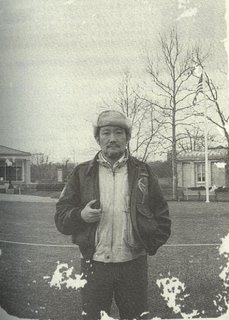IN DEEP APPRECIATION AND AFFECTION FOR CHANG HUNG-YI (對張弘毅深切的鑑賞及愛慕)
By Ron Norman 18/5/06
Peter Chang was an enormously talented composer, and my friend. He wrote so many beautiful memorable melodies for Taiwan's great singers, delicately controlled emotional soundtracks for Taiwan's great film directors, and passionate music that successfully merged traditional Chinese and Western classical.
張弘毅是一位極富才華的作曲家,也是我的朋友。他曾為台灣一流歌手寫下許多動聽難忘的歌曲,為台灣傑出電影導演,製作出敏銳適度有情感的聲帶,也譜出許多熱情洋溢的作品,成功地融合了中西古典音樂。
I knew Chang Hung-Yi since first coming to Taiwan in 1985, to work on Taiwan director Tan Han-Chung's three extraordinary films with Peter – Dark Night (An Yeh), Split of the Spirit (Li Gui Chan Juan), Rouge of the North (Yuan Nu) – together with singing stars Pan Yue-Yuen, Chang Shu-Na, Chyi Yu, and talented young Lu Szu-Chih, who wrote the words to Chyi's title song, one of Peter's favorites lyrics.
我是在1985年第一次來台灣時認識張弘毅的,那時是因與弘毅合作由但漢章導演的三部非常傑出的電影–《暗夜》,《離魂》,及《怨女》。一同合作的還有潘越雲, 江淑娜, 齊豫等歌星,及年輕有天份的呂思志,齊豫唱的主題曲《怨女》的歌詞就是他寫的,那也是弘毅最喜愛的歌詞之一。
Over the last two decades, I have sadly watched the popular commercial decline of countless luminous Taiwan artists. The loss to the quality of culture (and life) in Taiwan is enormous.
在過去這二十年來,我悲哀地目睹無數顯耀的台灣藝術家,在流行商業下衰退落沒。這是台灣文化(及生活)品質的巨大損失。
Taiwan is traditionally supposed to respect its elders, yet modern Taiwan culture copies the cruel American obsession with youth, because that is where the greatest profits are. Unfortunately, Taiwanese entertainment industry leaders are no less greedy and culturally nearsighted than the tycoons in modern Capitalist China.
台灣傳統上應是敬老尊賢的,然而近代文化卻抄習殘酷無情的美國式觀念,一昧重視年輕人,因為最大商業價值是在那兒。很不幸的是,台灣娛樂界的領導者,其貪婪與對文化的短視,並不亞於現在大陸的資本家。
In Vietnam, another Asian culture destructively colonized by American values, master artists like Khanh Ly, Elvis Phuong, Thai Chau, and Che Linh cannot get work and are forcibly retired, because they are considered "too old" by those who control the culture market.
越南是另一個受到美國式價值觀破壞的亞洲文化。在那裡,藝術大師如Khanh Ly, Elvis Phuong, Thai Chau, 及 Che Linh都因找不到工作而被迫退休,因那群控制文化市場的人認為這些大師年紀太大了。
Taiwan, too, often abandons its great mature artists, throwing them in the trash bin of forgotten history, the same way it discards historic buildings, factories, farmers, and fishermen.
台灣的情況也一樣,屢屢背棄它優秀資深的藝術家,將他們丟棄於被遺忘的歷史垃圾箱裡,正如它摒棄歷史建築,工廠,農夫,及漁人。
Yet, ironically, in America, inventor of Youth Culture, stars like Frank Sinatra, Tony Bennett, Ella Fitzgerald, Bob Dylan, and the Rolling Stones still recorded and sold-out concerts into their old-age.
但很諷刺的是,在美國,提倡青年文化的名人,例如法蘭克辛納屈,東尼班尼特,艾拉費茲傑拉,巴布狄倫,及滾石合唱團,即使他們年紀大了,仍舊在出唱片,音樂會也賣的場場爆滿。
When will Taiwanese respect and USE the gifts from its older artists who courageously open their hearts and spirits to provide nourishment, hope, and visions of a life worth living?
台灣人什麼時後才會重用本土資深藝術家的創作? 這群藝術家曾勇敢地打開自己的心靈,為這可貴的生命帶來滋潤,希望,及憧憬。
Respect does not mean handing out Presidential medals, Golden Horses and Golden Melody Awards. Respect means enthusiastically supporting and promoting artists so they can sustain their creative voice to reach out to the community.
所謂尊重不是授予總統獎章,金馬獎,及金曲獎。尊重是熱心地贊助及宣揚這些藝術家,使他們可以維持其富有創造力的聲音,得以廣達到社會大眾。
Peter Chang was rightly frustrated because, at the height of his creative power, his voice was cut-off, ignored by younger singers, music companies, film producers and directors, TV and radio programmers, the media, and the most bitter reality of all, Taiwanese audiences.
張弘毅理當是很失意的,因為,正值他創作的高峰,他的聲音被截斷了,被忽視了 - 被年輕一代的歌手,音樂公司,電影製片人及導演,電視及收音機節目製作人,大眾媒體,以及最痛苦的現實是被台灣的聽眾。
Every weekend in Hsimenting, new cute boys and girls with limited talent and average voices, are cynically marketed to teenagers to sell CDs. They sing forgettable sweet, emotionless songs, written by forgettable composers.
可笑的是,在西門町的每個周末,總有漂亮新面孔的男孩女孩,在推銷他們的專輯給青少年。他們資質有限、嗓子平平,唱的是那種悅耳但沒感情的歌,那曲子和作曲者也讓人記不得。
Chang's songs, and the singers who performed them, are never forgettable. They touch hidden emotional pressure points deep within our individual and cultural life experiences.
張弘毅的歌,以及唱他的歌的歌手,卻是永遠不會被人遺忘的。他們能觸動埋藏在我們內心深處,個人和文化背景的感情穴位。
Like most of us, Peter had so many worthy unfulfilled dreams – composing operas and theater scores, working with me on a Taiwan film, touching the hearts of young audiences, teaching new generations the limitless creative possibilities of music.
如我們一般,弘毅還有許多尚未完成的夢想 – 例如歌劇作曲及戲劇配樂,與我合作一部台灣電影,啟發年輕聽眾的內心,教導新一代對音樂無止境創作的可能性。
Peter's CD with Lin Geh-Hsieh and the London Symphony Orchestra is just one glimpse of his unused potential. His emotional musical contributions to Taiwan's democracy is another. (Peter's powerful musical expression of idealistic hope for Taiwan was written before the DPP lost its focus and became corrupted, like all political parties in all nations.)
從弘毅與林志炫及倫敦交響樂團合作的CD,就可以略微看到他尚未發揮的潛能。在他為台灣民主運動所作富有感情的作品中,也可一瞥。(弘毅強有力的音樂,表達對台灣的理想希望,是寫於民進黨尚未遺失焦點及未腐敗前,就如同各國的政黨。)
There are many human tragedies in the world: Africa, America, China, Taiwan politics. Compared to those, Taiwanese rejection of its extraordinary film and music artists may seem insignificant, but it is also a tragedy, for Taiwan and world culture.
世界各地都有人類的悲劇: 在非洲,美洲,中國,及台灣政治。和這些相比,台灣對非凡的電影及音樂藝術家的排斥似乎是微不足道的,但對台灣及世界文化來說,這仍舊是個悲劇。
Peter leaves a wonderful, supportive, strong wife and talented son and daughter. And he leaves us a large library of great music for caring audiences to enjoy forever. I hope sensitive, independent young singers of the future will discover and make use of Chang Hung-Yi's treasures.
弘毅身後留下一位賢慧體貼而堅強的妻子,及頗有天賦的一子一女。同時,他也留給我們許多優美的音樂,讓喜歡他的音樂的聽眾,永遠得以享受。我希望有感性,有獨立性的未來年輕歌手們,能發覺並好好利用張弘毅所留下的寶藏。
I will always remember Peter for his unending search for musical truths…. a larger than life, quiet, modest, idealistic, caring man with a passionate heart.
我將永遠不會忘記弘毅對音樂真理的無止境追求…。他是一位不凡的,沈默的,謙虛的,有理想的,有愛心的人,他有著一顆充滿熱情的心。


